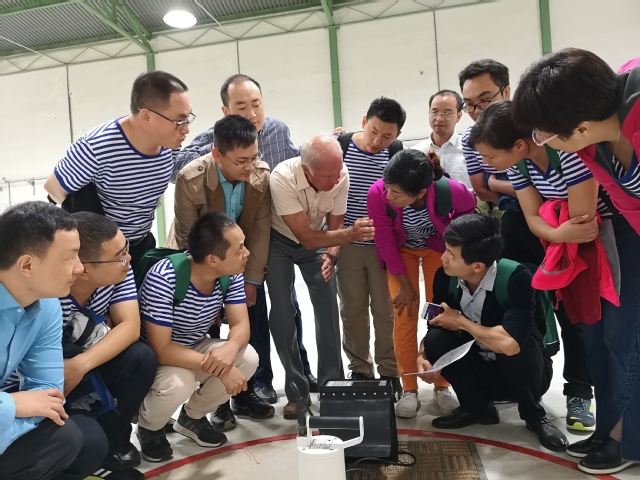School of Earth Sciences, established in 1956 when East China University of Technology was founded, is a historical and outstanding school with distinctive features in ECUT. The goal of development set by the school is "To contribute to the national nuclear geology and geosciences, and to build a domestically and internationally renowned talent base and research center in the field of earth science." Currently, this school has 4 departments, namely, Department of Geology, Department of Urban/Rural Planning, Department of Mining Engineering and Department of Geography, with approximately 1000 undergraduates and postgraduates(as of 2019).
The school offers a doctoral program in Geological Resources and Engineering, 5 master programs in Geological Resources and Engineering, Geology, Geography, Land Resources Management, Geological Engineering, Urban / Rural Planning, and 4 bachelor programs in Resource Prospecting Engineering, Mining Engineering, Urban/Rural Planning, Physical Geography and Resource Environment. The Discipline of Geological Resource and Engineering is approved by Jiangxi Province as the provincial first-class and high-level discipline. Resource Prospecting Engineering is rated as state-level characteristic specialty and national defense key construction specialty.
School of Earth Sciences has achieved good results in teaching and research, including one nationally-approved sample teaching center for radioactive geology and four provincial high-quality courses like General Geology, CrystallographyMineralogy, Uranium Geology, and Tectonics. In addition, the school owns one geology museum which is the science popularization education base for Jiangxi provincial youth.
Staff
Our school has a well-experienced teaching and research team of 165 excellent researchers and instructors including 22 professors, one of which is a Deputy Editor of Ore Geology Reviews, an internationally renowned publication. We put a high premium on teachers’ development and the development of teaching teams, forming several provincial innovative teaching and research teams in the fields of geology.
Students Cultivation
We are committed to cultivate practical, innovative, and employable talents with solid theoretical professional knowledge and advanced technology to meet the demands of national development of defense, industry andeconomy. Our school emphasizes the students’ involvement in teachers’ research projects, with more than 80% of students involved in different kinds of practical works every year, including graduation practice, graduation project (thesis) and extracurricular scientific activities.

Facilities
The school has one teaching center and three key laboratories, namely, Key Laboratory of Nuclear Resources and Environment of Ministry of Education, Laboratory of Key Disciplines of National Defense in Radioactive Geology and Prospecting and Digital Land Key Laboratory of Jiangxi Province. Two provincial Engineering Technology Centers are serving as the students practicing bases,namely, Nuclear Resources and Environmental Engineering Technology Center and Digital Engineering Experimental Center for Nuclear Facilities.
The school owns more than 7 systematiclaboratories helping teaching activities, including Basic Geology Laboratory, Tectonic Geology Laboratory, Ore Deposit Geology Laboratory, Remote Sensing Geology Laboratory, Rocks and Minerals Identification Laboratory, Land Planning and Evaluation Laboratory, Mining Engineering Laboratory. We have founded 17 professional practical teaching bases in Zhejiang Province, Jiangxi Province, Hunan Province, and 2 Practice Bases of Combining Production, Learning, Research and Utilization in Jiangxi and Inner Mongolia.
Research
In recent years, our school has conducted over 300 research projects specializing in uranium and polymetallic metallogenic theory, metallogenic planning,geological disposal of nuclear waste, Danxia (Cheltenham) landforms and tourism development and remote sensing and information systems. These projects mostly have been funded by national or international organizations: InternationalAtomicEnergyAgency (IAEA), Natural Science Foundation of China (NSFC), Bureau of Science and Technology for National Defense Industry in China, Chinese Ministry of Land and Resources, Bureau of Nuclear Geology in China, Chinese Ministry of Education, etc.
Based on these projects, great scientific achievements have been reached in recent years, including scientific achievements awards, 12 academic monographs andmore than 200 international academic publications, 100 of which are collected by SCI, EI and ISTP.
International Exchange
School of Earth Sciences has actively engaged with leading institutions around the world for student exchange, faculty exchange, research collaboration and laboratory construction. More than 50 lecturersof the school have participated in research exchange and training abroad every year, such as in America, Russia, Canada, South Africa and Japan. Meanwhile, international experts and scholarshave been invited to hold seminars for our teachers and students. The school successfully hosted several international conferences, such as International Symposium on Uranium Mineralization. Moreover, the school undertakes IAEA technician training every year, and the professors of the school volunteer their service as the consultants for IAEA.
Achievements
Thanks to the persistance and diligence of the whole school, we have gained great achievements in the fields of talent cultivation, graduates, discipline development and social service. Students and staff are deeply involved in the local economic development by acting as the community or government consultants and the utililization of the knowledge and technology created by them. We also instruct the humanities in our disciplinary fields, fulfilling the commission of a national university, including the promotion of the peaceful utility of Uranium in the world.
Programs
Resource Prospecting Engineering
Core Courses: Ore Mineralogy, Geochemistry, Uranium Geology, Uranium Exploration.
Mining Engineering
Core Courses: Metal (uranium) Deposits Underground Mining, Ventilation and Safety in Mining, Lane Engineering, Rock Blasting Engineering, Open-pit Mining
Physical Geography and Resource Environment
Core Courses: Principles of Tourism Geoscience, Survey and Evaluation of Geoscience Tourism Resources, Geoscience Tourism Planning and Design, Geopark Science, Environment and Heritage Commentary, Tourist Scenic Spots Design.
Urban/Rural Planning
Core Courses: Principle of Urban Planning, Chinese and Foreign Urban Construction History and Culture protection, Urban Master Planning, Control Detailed Planning, Urban Desig